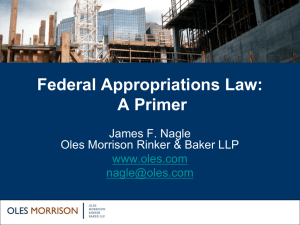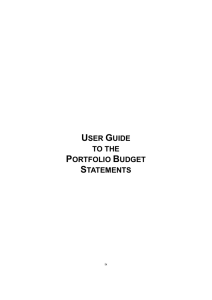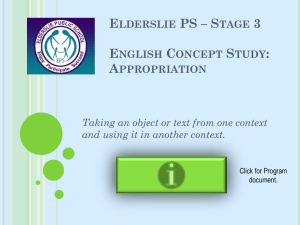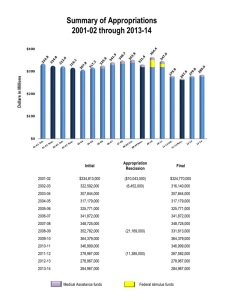Treasury Board Publications / Publications du Conseil du Trésor (97
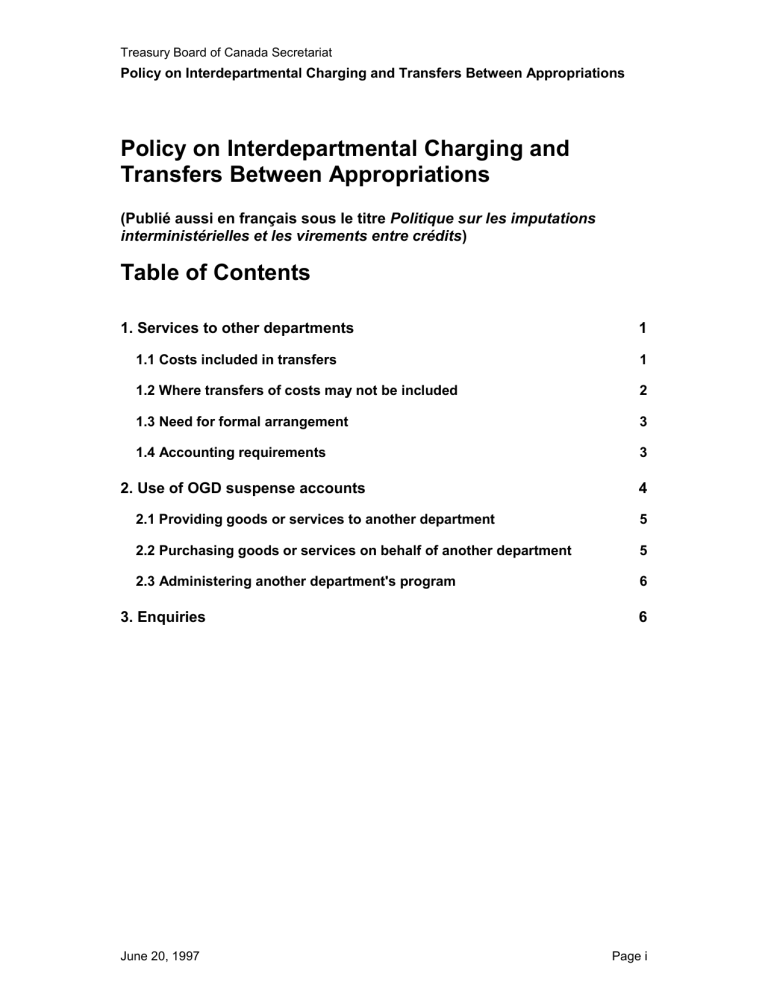
Treasury Board of Canada Secretariat
Policy on Interdepartmental Charging and Transfers Between Appropriations
Policy on Interdepartmental Charging and
Transfers Between Appropriations
(Publié aussi en français sous le titre Politique sur les imputations
interministérielles et les virements entre crédits)
Table of Contents
1. Services to other departments
1.1 Costs included in transfers
1.2 Where transfers of costs may not be included
1.3 Need for formal arrangement
1.4 Accounting requirements
2. Use of OGD suspense accounts
2.1 Providing goods or services to another department
2.2 Purchasing goods or services on behalf of another department
2.3 Administering another department's program
3. Enquiries
5
6
4
5
6
2
3
3
1
1
June 20, 1997 Page i
Treasury Board of Canada Secretariat
Policy on Interdepartmental Charging and Transfers Between Appropriations
The project to cancel the Guide on Financial Administration (GFA) has been approved. The purpose of cancelling the Guide is to create a single source of reference for all financial management policies.
This chapter of the Comptrollership Volume consists of sections of the old Guide on
Financial Administration. At the earliest opportunity, these policies will be re-written in the new Treasury Board Secretariat (TBS) policy format .
On June 20, 1997, the Policy on Interdepartmental Charging and Transfers Between
Appropriations was appended to include Section 1 on Services to other departments.
1. Services to other departments
(a) This section concerns the policy for the costing, charging and recovery of expenditures incurred in the transfer of goods or services between budgetary appropriations (within a department or between departments), to facilitate more accurate distribution of costs among programs, and to encourage the efficient use of available resources within the government.
(b) The Policy on Interdepartmental Charging and Transfers Between
Appropriations arose from a desire to have a mechanism to deal with the provision of goods and services between departments where these goods and services are not part of a department’s on-going activities or operations and do not contribute to its own mandate. These transactions must not form a "regular line of business" and in these cases the interdepartmental charge is limited to the department’s "out-of-pocket" expenses, in effect merely restoring them to where they were before they took on the extraordinary task.
1.1 Costs included in transfers
(a) Charges should be levied in most situations where goods or services are transferred from one budgetary appropriation to another. However, when the administrative costs required to charge and recover for the transfer are excessive in relation to the value of the goods or services transferred, departments may provide the goods or services without charge.
(b) It is important to note that cost transfers between budgetary appropriations are restricted to incremental costs. There should be no charging for or recovery of imputed or fixed costs, as such costs are included in the appropriation of the program supplying the goods and services. If the recovery and crediting of such fixed or imputed costs were permitted, it could circumvent the authority of Parliament, in that the funds available to the appropriation would exceed the amount intended in the
Parliamentary vote.
June 20, 1997 Page 1
Treasury Board of Canada Secretariat
Policy on Interdepartmental Charging and Transfers Between Appropriations
(c) Incremental costs may be viewed as the increased costs to the supplier's appropriation resulting from the added requirement to provide additional goods or services. These costs may include expenditures for materiel, labour, inventories, consulting services, or other items associated with the provision of goods or services.
Many cost items will be unaffected by the provision of these incremental goods or services and therefore are not included as part of the charge to the recipient's appropriation. Any costs which have been provided for by the amount appropriated by Parliament to the supplier's appropriation cannot be recovered.
(d) In most cases incremental costs are restricted to operating costs. Capital costs, however, may be included as incremental costs, but only if the capital assets in question are purchased solely for the purpose of providing goods or services to another appropriation. Depreciation or amortization charges related to capital assets which may have been used in providing the goods or services but were not obtained specifically for that purpose may not be included as incremental costs.
1.2 Where transfers of costs may not be included
This policy does not apply in those circumstances where the transfer of goods or services from one budgetary appropriation to another appropriation (either within a department or between departments) is subject to specific legislation or other Treasury
Board direction. These circumstances include the following:
– departments and agencies with appropriations that fund organizations whose primary role is to provide goods or services to other departments of the government (i.e., common service organizations), or other appropriations within their own department or agency;
– situations where legislation, regulations or executive order specify that a rate or fee is to be charged and it is impractical or illegal to set a separate fee for transactions internal to the government;
– the disposal of surplus materials which are subject to the Surplus
Crown Assets Act;
– operations which are financed through the use of a revolving fund and are therefore subject to the provisions of Treasury Board Manual —
Comptrollership Volume, Chapter 5-6, Policy on Special Revenue Spending
Authority;
– situations where a service or facility is shared by two or more departments and where by Treasury Board direction, one department incurs the costs and recovers a portion of them from the other department(s). (In this situation total costs should be prorated among the departments according to a written cost-sharing arrangement.)
June 20, 1997 Page 2
Treasury Board of Canada Secretariat
Policy on Interdepartmental Charging and Transfers Between Appropriations
1.3 Need for formal arrangement
(a) A written financial arrangement between the supplier and the recipient shall be entered into prior to the provision of goods or services. (If, in the opinion of the deputy head or delegate, an emergency situation exists this stipulation could be waived, but a written confirmation should be exchanged when possible.) This arrangement provides the basis for charging and recovering for the goods or services transferred between appropriations.
(b) The financial arrangement should be negotiated by the responsible managers within the organizations concerned and include:
– a clear delineation of the respective responsibilities of the parties involved;
– specifications detailing the goods or services to be provided;
– date(s) when such goods or services are to be provided;
– the estimated costs involved;
– the terms and conditions under which recoveries will be made; and
– any other terms or conditions considered necessary.
1.4 Accounting requirements
(a) A departmental recording process shall be maintained to identify incremental costs applicable to the goods or services provided, and to explain these costs to the receiving appropriation and facilitate their transfer. This recording process should be as detailed as is necessary to meet the requirements of Chapter 5-1 of the Treasury
Board Manual — Comptrollership Volume as well as the Chart of Accounts Volume , and must as a minimum be auditable. (One method of meeting this requirement might be through use of departmental suspense accounts, which would temporarily capture transactions until such time as the goods or services were transferred to the recipient.)
(b) When goods are transferred under this policy, and these goods are drawn from inventory purchased in a prior year, the recovery shall be credited to the supplier's appropriation in the year in which the transfer takes place, to provide for replacement of the inventory. In all other cases, recoveries shall be credited to the supplier's appropriation in the same fiscal year as that in which the incremental costs are incurred.
June 20, 1997 Page 3
Treasury Board of Canada Secretariat
Policy on Interdepartmental Charging and Transfers Between Appropriations
(c) The supplier shall credit the recovery to the same appropriation as was used to record the original cost. To capture these recoveries in the supplier department, economic object 3472 entitled "Incremental recoveries of expenditures from other appropriations" has been established in standard object 15 in gross standard object 12 in the Master List of Objects of Expenditure. The net result will be to restore the appropriation to its original amount, and ensure that the individual economic objects reflect the total purchases from outside the Government of Canada.
(d) The recipient of these goods or services will continue to charge standard object 15 for the goods or services received. For these transactions, economic object 3471 has been established within gross standard object 12 entitled "Incremental charges from other appropriations". This object should be used to record transfers of goods or services between budgetary appropriations.
(e) In those cases where Parliament has granted authority to net-vote including revolving funds, recoveries should continue to be credited to the standard object normally used for receipts and revenues credited to the vote, (gross standard object 13) using the pertinent source object in standard object 16.
(f) The recipients of goods and services from organizations where Parliament has granted authority to net vote including revolving funds will charge the relevant economic object in standard object 15 "Goods and services from internal sources" for the goods or services received. For these transactions, the economic objects established within gross standard object 01 to 11 (3302 to 3413 inclusive) should be used to record the purchase of goods or services.
2. Use of OGD suspense accounts
By definition, a suspense account is an account to which a transaction is posted on a temporary basis until its ultimate disposition is determined. As such, Other
Government Department (OGD) suspense accounts do not represent a Parliamentary authority and therefore cannot be used per se to authorize payment out of the
Consolidated Revenue Fund. The following outlines the proper procedures to follow when:
– providing goods or services to another department or sharing common administrative costs;
– purchasing goods or services on behalf of another department; and
– actually administering another department's program, such as managing a contribution arrangement and paying a contribution on behalf of another department.
June 20, 1997 Page 4
Treasury Board of Canada Secretariat
Policy on Interdepartmental Charging and Transfers Between Appropriations
2.1 Providing goods or services to another department
(a) If goods or services are provided to another department, the department providing the goods or services should not charge the payments to an OGD suspense account. As explained below, OGD suspense accounts are only to be used when a department is administering a second department's program. In all other cases, the department providing the goods or services should charge the expenditures to its own appropriation and recover the incremental costs from the other departments or, in the case of designated common service organizations, in accordance with the common service policy.
(b) For accounting and control purposes, as well as to segregate these transactions from those that constitute departmental use of resources, a department providing goods or services to other departments may set up a separate sub-account within its appropriation. However, until the department has been reimbursed, these payments constitute a use of spending authority and must be aggregated with other payment transactions to ensure the department's expenditures do not exceed the amount of its appropriation.
2.2 Purchasing goods or services on behalf of another department
Other than the actual provision of goods and services, there are situations where one department, with limited resources, makes major purchases of goods or services on behalf of another department, such as when orders are combined in order to obtain larger volume discounts. In these situations, there are three possible ways of funding the transaction:
– structure the contracts in such a way that responsibility for making the appropriate payment resides with the second department, even though the first department is the contracting and inspection authority. In the case of consolidated purchasing, the contract could require the supplier to invoice each department separately or the inspection authority could forward the approved invoices to the department responsible for payment;
– the department on whose behalf the goods or services are being purchased may make an agreement and provide an advance payment to the department making the initial purchase; or
– the payments could be charged to a suspense account within the appropriation of the department on whose behalf the material is being purchased. This would require the Minister of that department to delegate signing authority pursuant to section 33 of the Financial Administration Act to a person in the department making the purchase.
June 20, 1997 Page 5
Treasury Board of Canada Secretariat
Policy on Interdepartmental Charging and Transfers Between Appropriations
2.3 Administering another department's program
(a) An OGD suspense account may be used when a department is actually administering another department's program (for instance, the administration and payment of a grant or contribution program), or is incurring expenditures for another department (such as the purchase of goods and services for the other department's program) that do not fall within the mandate of the administering department and consequently cannot be charged to that department's vote because
– section 3 of every Appropriation Act requires that amounts authorized to be paid or applied be so paid or applied only for the purpose and in accordance with the terms and conditions of the Vote; and
– paragraph 33(3)(a) of the Financial Administration Act precludes requisitioning a payment that would not be a lawful charge against the appropriation.
(b) However, as mentioned above, departments, agencies, and Crown corporations should note that the administering department may not charge payments against an OGD suspense account and recover later. Thus, where one department is acting on behalf of another and payments are not within the scope and purpose of the administering department's vote, the administering department must either obtain authority to charge the other department's appropriation directly or, if an OGD suspense account is used, ensure that funds are transferred from the other department into the account before payments are made. OGD suspense accounts must not be allowed to go into a negative (debit) balance. Similarly, where a department makes a payment that includes a provincial, municipal or foreign government's share of a joint program, the department must either:
– have specific Parliamentary authority to make a recoverable advance equal to the provincial, municipal or foreign government's share of the cost; or
– obtain from the provincial, municipal or foreign government and deposit in the Consolidated Revenue Fund, an advance sufficient to cover that government's share of the payment.
3. Enquiries
Enquiries concerning this policy should be directed to your departmental headquarters.
For interpretation of this policy, departmental headquarters should contact:
Financial and Contract Management Sector
Comptroller General Branch
Treasury Board Secretariat
L'Esplanade Laurier
June 20, 1997 Page 6
Treasury Board of Canada Secretariat
Policy on Interdepartmental Charging and Transfers Between Appropriations
300 Laurier Ave West
Ottawa, Ontario
K1A 0R5
Telephone: (613) 957-7233
Facsimile: (613) 952-9613
June 20, 1997 Page 7


